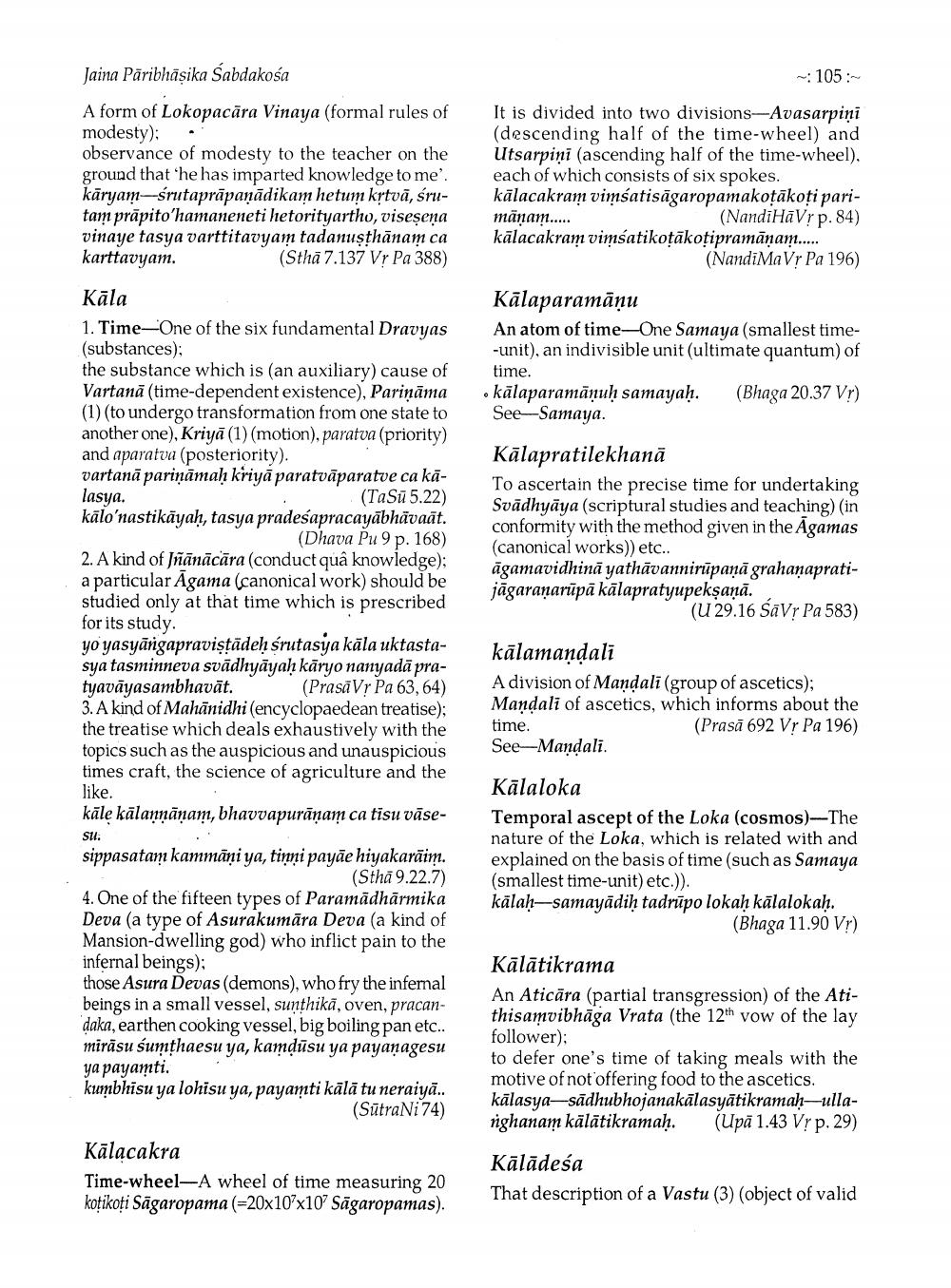________________
Jaina Pāribhäsika Sabdakośa
- 105:
A form of Lokopacāra Vinaya (formal rules of modesty); - observance of modesty to the teacher on the ground that he has imparted knowledge to me'. kāryam--srutaprāpaņādikam hetum krtvā, srutam prăpito'hamaneneti hetorityartho, viseșena vinaye tasya varttitavyam tadanusthānam ca karttavyam.
(Sthā 7.137 Vr Pa 388)
It is divided into two divisions-Avasarpini (descending half of the time-wheel) and Utsarpini (ascending half of the time-wheel), each of which consists of six spokes. kālacakram vimsatisāgaropamakotākoti parimānam....
(NandiHãVr p. 84) kālacakram vimsatikotākořipramānam.....
(NandiMa Vr Pa 196)
Kālaparamāņu An atom of time-One Samaya (smallest time-unit), an indivisible unit (ultimate quantum) of time. .kālaparamānuḥ samayaḥ. (Bhaga 20.37 Vr) See-Samaya.
Kālapratilekhanā To ascertain the precise time for undertaking Svādhyāya (scriptural studies and teaching) (in conformity with the method given in the Agamas (canonical works)) etc.. āgamavidhinā yathāvannirūpaņā grahaņapratijāgaranarūpā kālapratyupekṣaṇā.
(U 29.16 SãVr Pa 583)
Kāla 1. Time-One of the six fundamental Dravyas (substances); the substance which is (an auxiliary) cause of Vartanā (time-dependent existence), Pariņāma (1) (to undergo transformation from one state to another one), Kriyā (1) (motion), paratva (priority) and aparatva (posteriority). vartanā pariņāmah kriyā paratvāparatve ca kālasya.
(TaSū5.22) kālo'nastikāyaḥ, tasya pradeśapracayābhāvaāt.
(Dhava Pu 9 p. 168) 2. A kind of Jñānācāra (conduct quâ knowledge); a particular Āgama (canonical work) should be studied only at that time which is prescribed for its study. yo yasyāngapraviştädeh srutasya kāla uktastasya tasminneva svādhyāyah kāryo nanyadā pratyavāyasambhavāt. (PrasãVr Pa 63, 64) 3. A kind of Mahānidhi (encyclopaedean treatise); the treatise which deals exhaustively with the topics such as the auspicious and unauspicious times craft, the science of agriculture and the like. kāle kälannāņam, bhavvapurānam ca tisu vāseSu. sippasatam kammāni ya, tinni payāe hiyakarāim.
(Stha 9.22.7) 4. One of the fifteen types of Paramādhārmika Deva (a type of Asurakumāra Deva (a kind of Mansion-dwelling god) who inflict pain to the infernal beings); those Asura Devas (demons), who fry the infernal beings in a small vessel, sunthikā, oven, pracandaka, earthen cooking vessel, big boiling pan etc.. mirāsu sumthaesu ya, kamdūsu ya payaņagesu ya payamti. kumbhisu ya lohisu ya, payamti kālā tu neraiyä..
(SūtraNi 74)
kālamandali A division of Mandali (group of ascetics); Mandali of ascetics, which informs about the time.
(Prasā 692 Vr Pa 196) See-Mandali.
Kālaloka Temporal ascept of the Loka (cosmos)-The nature of the Loka, which is related with and explained on the basis of time (such as Samaya (smallest time-unit) etc.). kālah-samayādih tadrupo lokaḥ kālalokaḥ.
(Bhaga 11.90 Vr)
Kālātikrama An Aticāra (partial transgression of the Atithisamvibhāga Vrata (the 12th vow of the lay follower); to defer one's time of taking meals with the motive of not offering food to the ascetics. kālasya-sādhubhojanakālasyātikramah-ullarighanam kälātikramaḥ. (Upä 1.43 VI p. 29)
Kālacakra Time-wheel-A wheel of time measuring 20 kotikoti Sāgaropama (=20x107x10 Sägaropamas).
Kālādesa That description of a Vastu (3) (object of valid




